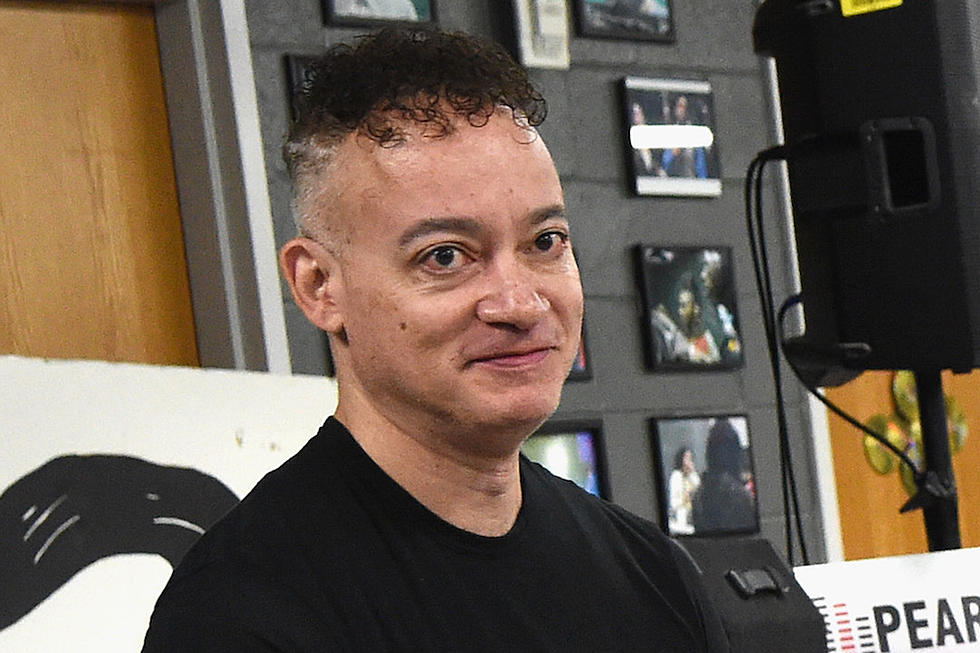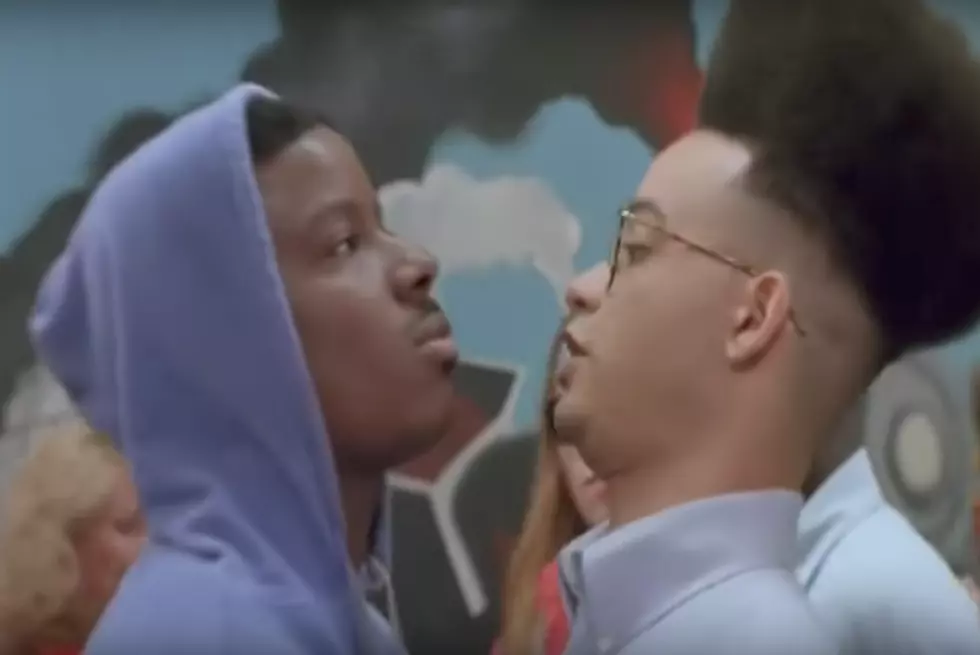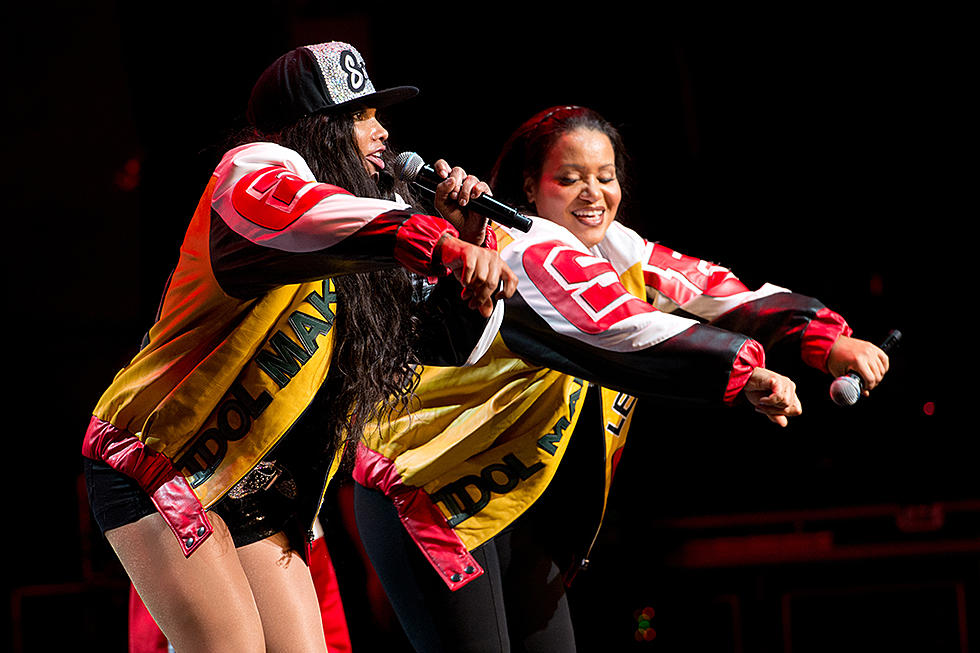![Kid N’ Play Talk Career Highlights, the State of Hip-Hop in 2015 and Solo Projects [EXCLUSIVE INTERVIEW]](http://townsquare.media/site/625/files/2015/05/Kid-n-Play-mega-pixels-2-1-of-1.jpg?w=980&q=75)
Kid N’ Play Talk Career Highlights, the State of Hip-Hop in 2015 and Solo Projects [EXCLUSIVE INTERVIEW]
When you hear the name Kid N' Play, you most likely think about the 1990 film, House Party. However, Christopher "Kid" Reid and Christopher "Play" Martin are more than just the two funny guys who wanted to throw a party when their parents were out of town. Since the release of their 1988 album, 2 Hype, which went gold, Kid N' Play have been entertaining hip-hop lovers all over the world with their upbeat sounds, good energy and iconic dance moves.
These days, performing has taken a bit of a backseat but Kid and Play have both pursued other facets of the music industry. While Kid is still working on the production end with other artists, Play has taken the filmmaking and teaching route, combining these interests into a new documentary, Can Hip-Hop Go to School?
The Boombox had the opportunity to talk with Play, who reminisced on his and Kid's illustrious career as well as their current endeavors. They were major players in hip-hop during the '80s and '90s, thanks to their work in films like House Party. “The reason why [the movie] was successful is because it wasn’t about two individuals being rap stars,” Play tells The Boombox. The group celebrated the 25th anniversary of House Party at the Everything Is Festival in May. “It’s two individuals navigating through feelings and situations and life and relate to [everyone] no matter what race or genre was.”
Play also recalls the best times on the road with Salt-N-Pepa, his outlook on the state of hip-hop in 2015, and why we may not be hearing a new Kid N' Play record anytime soon. Get involved in the conversation below.
You did the Everything is Festival a couple of months ago. But other than that, what are you guys up to these days?
We’re still performing. We have a huge summer waiting for us. But individually, Kid is a comedian -- very funny. [He] brings tears to my eyes. But also, he’s involved with music. Actually, he’s working with C.L. Smooth of Pete Rock & C.L. Smooth and working on some of the new material for him.
As for me, I’m more into the visual aspects of entertainment. I’ve been working on several documentaries. I’m getting ready to show one at a festival, [and it’s] called Can Hip-Hop Go to School?, which raises the question of whether hip-hop can be an accredited course in schools. And the question is put to a lot of well-known people from Kevin Hart to Laz Alonso, you name it, everybody. All my friends in the business talk about if hip-hop was taught -- its history and culture -- in schools, what would happen. So I’m very excited to show that.
But also, I’m working on a documentary called And I Dance, which is a documentary about '80s and '90s hip-hop dancers, who started dancing with us and Salt-N-Pepa and Naughty by Nature then went on to dance with Madonna, Janet Jackson, Michael Jackson. They talk about how things were behind-the-scenes, and how the women didn’t have to do anything to jeopardize their credibility or respect or anything besides being good dancers. So I’m really excited about that project that I plan on introducing at the end of this year.
Since you mentioned the documentary regarding hip-hop being an educational course, you’re a professor as well. Can you talk a little bit about that?
I’m not an official professor. A lot of people call me Professor Play, but I won’t accept that title because I don’t want to disrespect those who did what it took to get those type of titles, PhDs, professors or whatever. But yes, I’ve been teaching for well over 18 years now where I’ve taught at North Carolina Central University, Florida A&M University and Miles College.
I’ve also been a lecturer and have spoken at Stanford [University], Duke University and community colleges as well. So I’ve been doing that for a very long time. This documentary, Can Hip-Hop Go to School, is a video journal of that journey [when] I was performing on the weekends with Kid and teaching or speaking at universities.
What were the topics you would be covering in your lectures?
Well, it’s really the history. I don’t want anybody to think it’s about teaching people how to rap. It’s far from that. It’s about the birth of hip-hop from the financial fiscal crisis in New York in the '70s and how budget cuts took away after-school programs and certain classes were taken out of school and how it forced the birth of what would later be called hip-hop. It gets into the economic situation of what was happening in New York at the time. So similar to today unfortunately, in a lot of cities, there’s talk about the need of an escape that’s going on. People went to the parks and listened to music to forget the problems that were going on at home. So what that was all about, but now how that’s all in the music and conscience of the lyricist.
One of the binding and -- what I feel -- is the best rap song ever made, is “The Message” by Grandmaster Flash and the Furious Five. And we just get into the rhythm, the rhyme and the reason and just dissect what was going on, what was it all about and the spiritualism -- all of that. We go in. We really go in. I also have a lot of guest artists who come in to speak like Daryl McDaniels from Run-D.M.C. and Trey Songz. You name them, and they’ve come to speak at one of my classes.
Looking back at all the times you guys have performed, what for you was the best experience you’ve had onstage?
I don’t have an answer for that question. There are just too many. Every show that Kid and I do now, I’m always glad that we got through it. We’ve had so many. But if I had to wind it down, it would be the shows we’ve done with our girls, our sisters, our best friends, Salt-N-Pepa. We did a lot of touring together. We shared four buses together. We were a family. We were a company so to speak. So I recently looked through some photos of us, and I remembered that time we toured together.
The ones that really were the best and most memorable were the ones we did with Public Enemy. Chuck D always wanted Kid N’ Play, and there was Digital Underground where Tupac was a backup dancer for them. We were real close with him, and I’ve got pictures and stuff with him. The first tour N.W.A. ever did was with Kid N’ Play. So that was special. So there’s so many special defining moments. So nothing can be that number one time.
So what do you think of hip-hop culture in 2015?
Well, I’m not a fan of it, but I’m not a fan of anything because a lot people forget that the word “fan” is short for “fanatic.” And I believe you should only be a fanatic for Jesus Christ. But in regards to it, I have a love for it. But I put it in this kind of metaphor, I feel as though rap music today is similar to what we experienced in the '70s or '60s when it came to a record being played to the '90s with the 12-inch single. Now you don’t have the luxury of two turntables. You only have one turntable, and there’s no more scratching. So it’s stuck in one place.
I feel that rap has a 12-inch high single, but the music is scratching right now. It’s redundant. If someone can fix the scratch in the records so the record could play. I love the '80s and the early '90s because you had radio then. When it was culturally accepted, you had diversity -- Heavy D & the Boyz then Public Enemy then Poor Righteous Teachers, Arrested Development, Kid N’ Play, Salt-N-Pepa. It’s hard for me, when I listen to [rap] today, to tell one artist from another unless I’m watching music videos. So that’s the issue I have with it. Artists need to have a voice. I wish there was more diversity and less of a division between the different age groups in rap and hip-hop. There’s ageism that’s not good for the culture as well.
Are there any artists in particular that you like to listen to?
When I have the time, I like Lupe Fiasco, but more underground artists. I don’t like questions like this because the names escape me. But there’s some diversity out there. Do I like it all? Not necessarily so, but I appreciate the effort. I appreciate the diversity of it. It’s interesting because when I meet a lot of them for the first time, you know, everybody likes some House Party.
Music aside, another facet of hip-hop is dancing and dance battles. The revival and creation of new moves continues. Do you keep up with the newer moves like the Shmoney dance or the Nae Nae? Do you think social media helped put those dances in the spotlight compared to back in the day?
Definitely! It’s a way to get it out there. I mean, the Bobby Shmurda dance, of course and a couple of others. But I feel like a lot of those dances are short-lived though. I think the two longest ones -- and I don’t feel comfortable because it’s me -- but the kick step still lives like Meek Mill is doing it in his video.
I mean, you don’t see Jay Z dance so in the “Picasso [Baby]” joint, he does the Kid N’ Play in it. And maybe the Dougie. I think that’s the last, most recent one that still has some legs to it. But a lot of them like the Stanky Leg, the Shmurda Dance, they don’t seem to have a very long shelf life. You can still pull dances from the '80s and '90s like the Wop and the Biz Markie [dance]. You still see a nice reaction because people are still familiar with it.
What do you feel like artists are facing in the industry now that you and Kid didn’t have to go through when you were coming up in the rap game?
I kind of feel for today’s artists. Some know it, and some don’t know it. There are those who remember how the industry used to be. And I think most of them would have loved to have their success happen during that time because it had some degree or longevity to it. It had a system. It wasn’t perfect. It wasn’t angelic, but you can count on a music video to last anywhere from three to six months. I really feel for artists today. One of their music videos will get old in a week, and I think that’s exhausting. You have to have the energy to put out so many music videos to stay relevant, and I think that’s a word that’s important -- “relevant” and trying to remain relevant.
Back then there was BET and Video Soul, and that’s where you got your visual stimulation from. There was some value in waiting to see the next video tomorrow at 4 p.m. Then there’s Video Music Box where people would wait every Friday to see the next video or next show. So the presentation was more valuable because you had to wait to get it. When you get things too easily, there begins to be no value in it because it’s not hard to get. So when I see entertainment today, the shelf life is not there. I think that’s kind of sad. But people who are born into it, they have accepted it. They just think that’s the way it should be. No, but there was a time when things were way more valuable.
Will there be new Kid N’ Play material happening in the near future?
That, for me personally, I’m not into anymore. The passion is gone. I love the fact and accepted the fact that it’s time to pass the torch. I’m not totally against it, but it would have to be something special. It would have to be something that just would mean something to me. Right now, we’re in a different place. It’s a different thing. It’s a different world.
See 50 Inspirational Quotes From Your Favorite Rappers
More From TheBoombox


![Christopher ‘Kid’ Reid Is Cool With LeBron James Rebooting ‘House Party’ [VIDEO]](http://townsquare.media/site/625/files/2018/04/Kid-Trusts-Lebron-With-House-Party-Reboot.jpg?w=980&q=75)





![Joell Ortiz & !llmind Do Things One Way on ‘Human’ Album, Honestly [EXCLUSIVE INTERVIEW]](http://townsquare.media/site/625/files/2015/07/Joell-Ortiz-and-llmind-Featured-Image.jpg?w=980&q=75)
